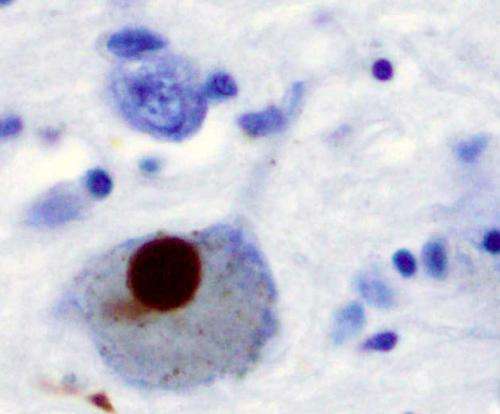Gene mutation linked to early onset of Parkinson's disease in Caucasians

A defect in a gene that produces dopamine in the brain appears to accelerate the onset of Parkinson's disease, according to new research from Iowa State University. The effect is particularly dramatic for people under age 50.
Auriel Willette, an assistant professor of food science and human nutrition; and Joseph Webb, a graduate research assistant, found on average that Caucasians with one bad version of the gene – guanosine triphosphate cyclohydrolase-1 or GCH1 – developed Parkinson's symptoms five years earlier, and had a 23 percent increased risk for the disease.
However, young-to-middle-age adults with the mutation had a 45 percent increased risk of developing Parkinson's disease. Researchers say the presence of the defective gene in older adults had minimal effect. The study is published in the journal Neurobiology of Aging.
Researchers know that rigidity and loss of muscle function associated with Parkinson's is linked to a depletion of dopamine in the part of the brain that controls movement. Willette and Webb say they wanted to take a more holistic approach with this study to better understand how this gene affects the course of the disease and certain outcomes such as motor skills and anxiety.
The study is the first to look at these different biological markers, as well has how the gene's impact on dopamine production specifically affects Caucasian populations. Willette says previous studies have focused primarily on Chinese and Taiwanese populations. The findings have the potential to help personalize medical care for people with a family history of Parkinson's disease, he said, similar to testing for the BRCA gene for women at risk for breast cancer.
"We want to have a more comprehensive understanding of what these genes related to Parkinson's are doing at different points in someone's lifetime," Willette said. "Then, with genetic testing we can determine the risk for illness based on someone's age, gender, weight and other intervening factors."
Why the difference in age?
Data for the study were collected through the Parkinson's Progression Markers Initiative, a public-private partnership sponsored by the Michael J. Fox Foundation for Parkinson's Research. The initiative evaluates people with the disease to develop new and better treatments. The Iowa State study included 289 people recently diagnosed with Parkinson's, but not on medication, and 233 healthy people.
Willette and Webb analyzed anxiety and motor function using the Unified Parkinson Disease Rating Scale – a tool that measures progression of the disease. They found those with the defective gene, regardless of age, were more anxious and struggled more with daily activities. However, Webb explains why the defective gene was not as strong of a predictor of developing Parkinson's in people over 50.
"As we age, we progressively make less dopamine, and this effect strongly outweighs the genetic influences from the 'bad version' of this gene. Simply by aging, our dopamine production decreases to the point that the effects from a mutation in this gene are not noticeable in older adults, but make a big difference in younger populations," Webb said.
Webb and Willette say it is also important to pay attention to blood cholesterol levels. Cholesterol is directly related to the ability to produce dopamine. High LDL, or what's considered "bad" cholesterol, is an established risk factor of Parkinson's, Willette said. Their study shows that carriers of the defective GCH1 gene had higher cholesterol than non-carriers, which was true regardless of age.
More information: Joseph Webb et al. Aging modifies the effect of GCH1 RS11158026 on DAT uptake and Parkinson's disease clinical severity, Neurobiology of Aging (2017). DOI: 10.1016/j.neurobiolaging.2016.10.006

















